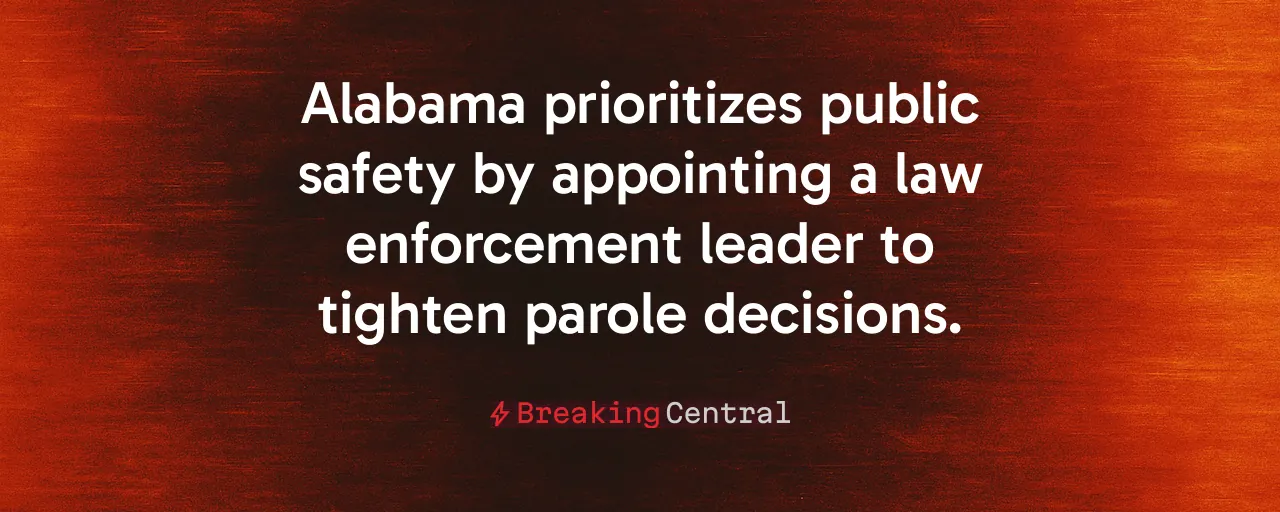A Bold Move for Alabama's Safety
Governor Kay Ivey recently named Hal Nash, a Jackson County Chief Corrections Deputy, as the new chair of Alabama's Board of Pardons and Paroles. The decision, announced with a clear nod to Nash's tough-on-crime credentials, sets the stage for a renewed focus on public safety. With Alabama grappling with violent crime rates above the national average, this appointment signals a commitment to prioritizing community protection over early prisoner releases.
Nash steps into a role that carries immense weight. The three-member board decides which incarcerated individuals can return to society, sets conditions for their supervision, and even holds the power to issue pardons. In a state where Birmingham and Mobile report troubling homicide numbers, the choice of a pro-law-enforcement leader suggests Ivey is doubling down on her Safe Alabama agenda, a legislative push to curb crime through stricter measures.
Why Public Safety Takes Center Stage
Alabama's violent crime rate, hovering around 5.1 per 1,000 residents, outpaces the national average. Cities like Birmingham and Mobile drive these numbers, with homicides and gun-related offenses casting a long shadow. During the tenure of the previous board chair, Leigh Gwathney, parole grants plummeted below 20 percent, a move that coincided with slight declines in certain violent crime categories. These trends underscore why many Alabamians demand caution when considering prisoner releases.
Victims and their families, in particular, rely on the parole board to act as a gatekeeper. The pain of losing a loved one to violence or enduring trauma from crime doesn't fade quickly. A board that prioritizes rigorous scrutiny ensures those voices are heard, offering reassurance that dangerous individuals won't return to the streets prematurely. Nash's law-enforcement background positions him to uphold this trust, emphasizing accountability over leniency.
The stakes extend beyond victims. Local communities, law-enforcement agencies, and taxpayers all feel the ripple effects of parole decisions. Releasing high-risk individuals into understaffed police districts, where gun violence is already a concern, could undo hard-won progress. Nash's appointment reflects a belief that public safety remains the guiding principle, even if it means keeping more people behind bars.
The Cost of Caution
Maintaining a low parole-grant rate comes with trade-offs. Alabama's prisons, already overcrowded, house thousands of parole-eligible individuals at an annual cost of $22,000 to $28,000 per inmate. Federal courts have flagged these conditions as potential Eighth Amendment violations, pointing to violence and understaffing. For families of the incarcerated, prolonged sentences strain emotional and financial resources, while communities face challenges reintegrating returning citizens.
Despite these pressures, the argument for restraint holds firm. Studies show that parole decisions blending validated risk-assessment tools with careful judgment reduce recidivism. Alabama's current approach, though restrictive, aligns with this evidence by prioritizing high-risk cases for denial. Expanding electronic monitoring, as Ivey has championed, offers a cost-effective alternative, allowing low-risk parolees to be supervised without straining prison budgets. Nash can build on this by pushing for more robust post-release oversight.
Lessons From Alabama's Past
The Board of Pardons and Paroles, established in 1939, wasn't always so cautious. Through the early 2010s, parole grants neared 50 percent, reflecting a more balanced approach. But high-profile crimes by recent parolees in 2019 prompted lawmakers to tighten eligibility and empower the governor to appoint the chair. The result was a sharp decline in releases, a shift that aligned with public demand for stronger deterrence amid rising urban violence.
This history reveals a clear pattern: Alabamians value safety when crime feels close to home. Nash's leadership will likely continue this trend, maintaining strict risk thresholds while exploring ways to enhance transparency. Public trust hinges on knowing the board's decisions are deliberate, victim-focused, and grounded in data. By modernizing data systems and addressing case backlogs, Nash can demonstrate that caution is not inaction.
A Path That Balances Strength and Fairness
Nash's appointment arrives at a pivotal moment. With Alabama's prisons under scrutiny and violent crime a persistent concern, the parole board faces complex demands. The solution lies in doubling down on what works: rigorous risk assessments, expanded electronic monitoring, and clear communication with victims and communities. These steps ensure public safety without ignoring the need for smarter resource use.
Fairness, too, matters. Taxpayers deserve a system that doesn't waste money on unnecessary incarceration, and low-risk individuals who've served their time deserve consistent, transparent evaluations. Nash has an opportunity to rebuild morale among board staff, streamline operations, and deliver results that reassure a wary public. His pro-law-enforcement stance necessitates pragmatic reforms.
Alabama's future depends on getting this right. By prioritizing safety, accountability, and efficiency, Nash can lead a parole board that protects communities while addressing the realities of an overburdened system. The road ahead won't be easy, but with a steady hand, Alabama can remain a place where justice serves the people first.
